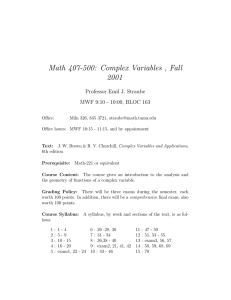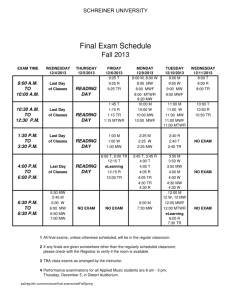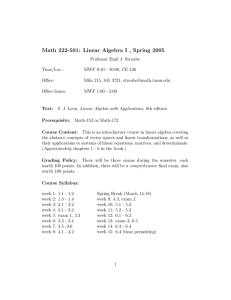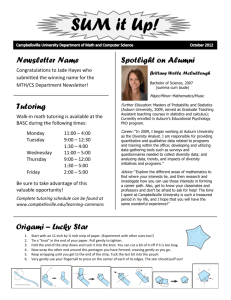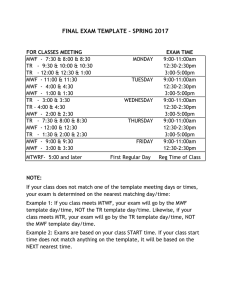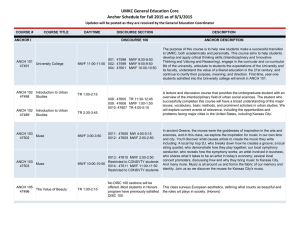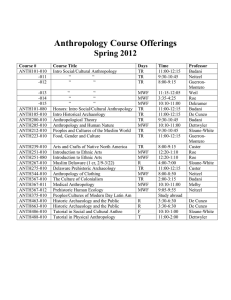UMKC General Education Core
advertisement
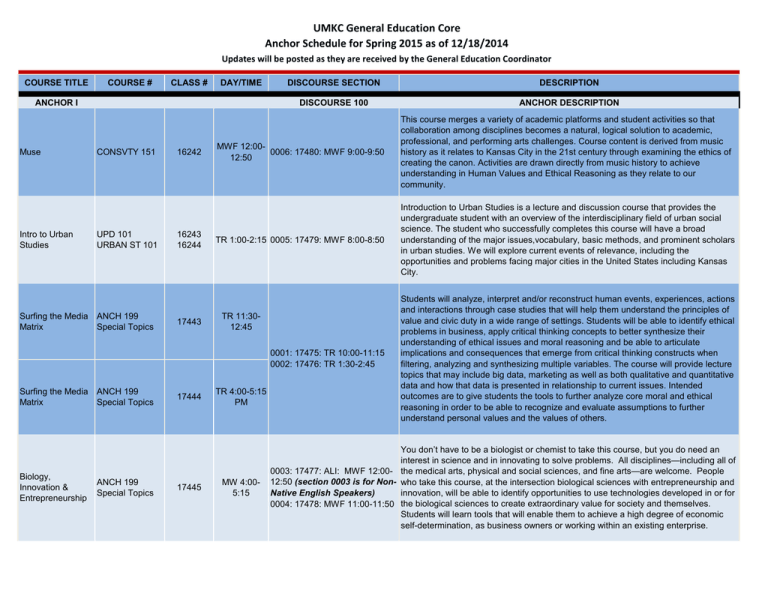
UMKC General Education Core Anchor Schedule for Spring 2015 as of 12/18/2014 Updates will be posted as they are received by the General Education Coordinator COURSE TITLE COURSE # CLASS # DAY/TIME ANCHOR I Muse Intro to Urban Studies CONSVTY 151 UPD 101 URBAN ST 101 Surfing the Media ANCH 199 Matrix Special Topics 16242 16243 16244 17443 DISCOURSE SECTION DESCRIPTION DISCOURSE 100 ANCHOR DESCRIPTION MWF 12:000006: 17480: MWF 9:00-9:50 12:50 This course merges a variety of academic platforms and student activities so that collaboration among disciplines becomes a natural, logical solution to academic, professional, and performing arts challenges. Course content is derived from music history as it relates to Kansas City in the 21st century through examining the ethics of creating the canon. Activities are drawn directly from music history to achieve understanding in Human Values and Ethical Reasoning as they relate to our community. TR 1:00-2:15 0005: 17479: MWF 8:00-8:50 Introduction to Urban Studies is a lecture and discussion course that provides the undergraduate student with an overview of the interdisciplinary field of urban social science. The student who successfully completes this course will have a broad understanding of the major issues,vocabulary, basic methods, and prominent scholars in urban studies. We will explore current events of relevance, including the opportunities and problems facing major cities in the United States including Kansas City. TR 11:3012:45 0001: 17475: TR 10:00-11:15 0002: 17476: TR 1:30-2:45 Surfing the Media ANCH 199 Matrix Special Topics Biology, Innovation & Entrepreneurship ANCH 199 Special Topics 17444 17445 TR 4:00-5:15 PM MW 4:005:15 Students will analyze, interpret and/or reconstruct human events, experiences, actions and interactions through case studies that will help them understand the principles of value and civic duty in a wide range of settings. Students will be able to identify ethical problems in business, apply critical thinking concepts to better synthesize their understanding of ethical issues and moral reasoning and be able to articulate implications and consequences that emerge from critical thinking constructs when filtering, analyzing and synthesizing multiple variables. The course will provide lecture topics that may include big data, marketing as well as both qualitative and quantitative data and how that data is presented in relationship to current issues. Intended outcomes are to give students the tools to further analyze core moral and ethical reasoning in order to be able to recognize and evaluate assumptions to further understand personal values and the values of others. You don’t have to be a biologist or chemist to take this course, but you do need an interest in science and in innovating to solve problems. All disciplines—including all of 0003: 17477: ALI: MWF 12:00- the medical arts, physical and social sciences, and fine arts—are welcome. People 12:50 (section 0003 is for Non- who take this course, at the intersection biological sciences with entrepreneurship and innovation, will be able to identify opportunities to use technologies developed in or for Native English Speakers) 0004: 17478: MWF 11:00-11:50 the biological sciences to create extraordinary value for society and themselves. Students will learn tools that will enable them to achieve a high degree of economic self-determination, as business owners or working within an existing enterprise. UMKC General Education Core Anchor Schedule for Spring 2015 as of 12/18/2014 Updates will be posted as they are received by the General Education Coordinator COURSE TITLE COURSE # CLASS # DAY/TIME ANCHOR II The Technology Enterprise SCE 201 16728 Queer in the City UPD 268 URBAN ST 268 WGS 268 17228 17227 17229 The Classical Mediterranean World (HONORS ONLY) ENGLISH 285 CLASSICS 285 HISTORY 220 16163 16162 16164 World Cultures, Hist & Ideas: HISTORY 260 Myths of the SPANISH 285 Spanish Conquest 17424 17426 DISCOURSE SECTION DESCRIPTION DISCOURSE 200 ANCHOR DESCRIPTION 0001: 17484: TR 4:00-5:15 0002: 17485: ALI: TR 4:00-5:15 (section 002 is for Non-Native TR 2:30-3:45 English Speakers) 0003: 17486: MW 4:00-5:15 0004: 17484: TR 4:00-5:15 0005: 17488: MW 4:00-5:15 MW 7:008:15 PM 0006: 17489: TR 10:00-11:15 0007: 17490: TR 11:30-12:45 0008: 17491: (blended*) *section 0008 meets Jan. 21st; weeks Feb. 16th, Feb. 23, Mar. 30th (week 11 after Spring Break), weeks of April 20 and 27 (14&15) This course focuses on the complexity of the decision making process in guiding the implementation of technology. Based on economic, environmental, social, and diversity aspects, cultural and technical issues are balanced on both a qualitative and quantitative basis to make good decisions. This course introduces queer theory within the context of gender studies and urban studies. We will read, discuss, and react to classic text in queer theory, lesbian and gay studies, and sexuality and space studies. There will be an emphasis on finding "otherness" within everyday spaces, places, texts, and discourses. TR 1:00-2:15 0009: 17492: MWF 1:00-1:50 This course examines the history, literature, and culture of Ancient Greece and Rome in the context of the Mediterranean world, from its origin until the Barbarian invasion. Students will read poetry, philosophy, history, rhetoric, and letters from primary text sources and they will study material evidence such as architecture, graffiti, and physical objects as representative survivals of these cultures. 0010: 17493: ALI: (online) 0011: 17494: (online) 0012: 17495: TR 10:00-11:15 0013: 17496: TR 11:30-12:45 0014: 17497: TR 10:00-11:15 0015: 17498: MW 4:00-5:15 The Conquest of the Americas has always been a point of controversy and acclaim. Worlds were upended. Millions of people died through the cumulative impact of warring, labor practices, and disease. Empires were torn down and reconstructed. Christendom was vastly expanded. And, African slaves, tomatoes, potatoes, horses, cattle, pigs, corn, and syphilis traversed the Atlantic in an epoch of unprecedented ecological and cultural exchange. Modernity itself was forged in the crucible of Conquest. This course studies the societies of central Mexico, the Andes, and the Iberian Peninsula on the eve of their encounter, the ways in which each of these distinct societies impacted one another, and the hybrid societies that emerged. We will study historical and literary works, images and films that have reimagined the Spanish conquest and addressed its complexities, myths and enduring legacies. Our examination of the historical and literary production from the 1970s serves as a basis for discussing past to contemporary ways of thinking as well as marginal to dominant realities. Online UMKC General Education Core Anchor Schedule for Spring 2015 as of 12/18/2014 Updates will be posted as they are received by the General Education Coordinator COURSE TITLE COURSE # CLASS # DAY/TIME ANCHOR II (contd) European Cultures, Hist & Ideas: NaziOccupied Europe Self in a Multicultural Society Religions of the World HISTORY 240 FRENCH 295 CPCE 220 ANCH 299 Special Topics 16246 17446 TR 10:0011:15 DISCOURSE SECTION DESCRIPTION DISCOURSE 200 ANCHOR DESCRIPTION The Second World War was not just an attempt by the Axis nations to create new military empires in Europe and the world. With the collaboration of many other nations, 0016: 17499: MWF 10:00-10:50 the Nazis attempted a genocidal war to systematically colonize, relocate and annihilate 0017: 17500: MWF 11:00-11:50 entire social groups. In this course we will study how attitudes about culture and 0018: 17501: MWF 12:00-12:50 diversity informed this genocidal war. To do so, we will adopt an integrative approach: 0019: 17502: TR 11:30-12:45 combining history and literature, philosophy and theory, humanism and social science, 0020: 17503: TR 1:00-2:15 reading and performance, analysis and creativity. This course takes an intentionally 0021: 17504: TR 2:30-3:45 cosmopolitan look at these tragic events, though at the center of them necessarily stands the annihilation of the Jews. No French necessary to enroll in the French section. 0023: 17506: MWF 1:00-1:50 0024: 17507: MWF 2:00-2:50 This course will focus on what it means for the individual to live in a multicultural, urban, and increasingly global society. Students will examine their own cultural identity, including values and worldviews as well as assumptions and biases regarding others’ diversity. In addition, the course will focus on learning about different cultures and issues associated urbanism, globalization, cultural conflicts and social advocacy. 17143 M 4:30-7:15 17447 This course will introduce the major religions of the world--Buddhism, Hinduism, Judaism, Christianity, Islam, Daoism, etc.--as well as traditional small group religions. The course will also look at the introduction of these religions in the United States and 0025: 17508: TR 11:30-12:45 how this has created religious diversity in our country. We will have a historical 0026: 17509: TR 1:00-2:15 overview of these traditions and study the roles that religious cosmologies, beliefs, TR 2:30-3:45 0027: 17510: MWF 9:00-9:50 ritual practices, ethical values, the performative and visual arts, and understandings of 0028: 17511: MWF 10:00-10:50 human nature play in the lives of people. In a non-judgmental setting, students will gain an appreciation of the many ways that human beings have striven to live authentic and principled lives, while learning how to compare religions in a neutral fashion. UMKC General Education Core Anchor Schedule for Spring 2015 as of 12/18/2014 Updates will be posted as they are received by the General Education Coordinator COURSE TITLE COURSE # CLASS # DAY/TIME ANCHOR II (contd) The Gothic and the Fantastic ANCH 299 Special Topics UPD 206 Cities of the World URBAN ST 206 SOCIOL 206 Diversity in Health ANCH 299 Special Topics 17337 16151 16248 17624 17449 ANCHOR III Innovation and the ANCH 399 Aging Population Special Topics DISCOURSE SECTION DESCRIPTION DISCOURSE 200 ANCHOR DESCRIPTION 0029: 17512: MWF 9:00-9:50 TR 2:30-3:45 0030: 17513: TR 8:30-9:45 0031: 17514: TR 5:30-6:45 TR 8:30-9:45 0032: 17515: MW 5:30-6:45 0033: 17516: MW 4:00-5:15 TR 1:00-2:15 0035: 17518: MWF 2:00-2:50 DISCOURSE 300 17388 This course looks at the Gothic and the Fantastic in literature and film since the 18th century, with an emphasis on the cultural contexts and larger significance of artistic creations. Our readings will include the first “Gothic novel,” The Castle of Otranto by Horace Walpole, and M.G. Lewis’s The Monk; ghost stories by Edgar Allan Poe, Alexander Pushkin, and Henry James; stories of the paranormal and occult by Prosper Mérimée and E.T.A. Hoffmann; Russian political satire by Nikolai Gogol and Mikhaul Bulgakov; films from Japan and eastern Europe; and the Freudian uncanny. Along the way, we will ask questions such as: How and why did this subgenre arise in the age of Enlightenment? What is modern and what is archaic about it? Is it a popular or a highculture mode? How do national boundaries and cultural differences affect literature of the Gothic and the Fantastic, and vice versa? How do media like prose fiction and film contribute to the occult imagination? Required course work will include regular attendance and participation, response papers, two essays, one group project/presentation, and a final exam. This course will focus on urban issues to help students develop global perspectives. Urbanization has been a global phenomenon, and more than half of the world population lives in urban areas. Students will learn past, present and future urban issues and challenges on the global scale and about how cities of the world have coped and will cope with these issues and challenges. This course will explore social determinants of health, i.e. how social, cultural, political, historical, and economic influences shape the individual’s own values, beliefs, and behaviors. This course expands students’ basic knowledge of cultural diversity to provide special focus on health disparities among marginalized populations. Students will examine diversity by exploring health inequities related to race and ethnicity, immigration status, disabilities, gender, access, poverty, sexual identity, and veteran status. The course includes experiential learning with organizations focused on reducing health disparities. ANCHOR DESCRIPTION How people interact with society, home, and community changes throughout life. So too does their spatial cognition, balance, and strength. Those changes call for modification of the “built environment” and the enabling technologies embodied in the 0001: 17519: MWF 10:00-10:50 environment. Some of those required changes constitute opportunities to think TR 2:30-3:45 0002: 17520: MWF 9:00-9:50 differently. Imagining a better world is only part of the picture, though. Without 0003: 17521: TR 1:00-2:15 translation to a sustainable business model, what might be a solution remains only an idea. This course will do more than teach you how to create something that might make a difference, you’ll learn how to get it into people’s hands. UMKC General Education Core Anchor Schedule for Spring 2015 as of 12/18/2014 Updates will be posted as they are received by the General Education Coordinator COURSE TITLE COURSE # CLASS # DAY/TIME ANCHOR III (contd) Frauds, Myths & Mysteries in Archaeology Archaeology of Ancient Disasters ANCH 399 Special Topics GEOLOGY 327 CLASSICS 327 Public Urban ANCH 399 Education Special Topics (HONORS ONLY) 17450 17285 17284 17451 online DISCOURSE SECTION DESCRIPTION DISCOURSE 300 ANCHOR DESCRIPTION 0004: 17522: (ONLINE) 0005: 17523: (blended*) *section 0005 Meets 7 weeks TR 10:00-11:15: Meet January 20th, weeks Feb 16th Feb. 23rd and weeks March 2 ,week March 30th, week April 6th, weeks of April 20 and 27 (14 &15) 0006: 17524: MWF 1:00-1:50 0007: 17525: MWF 2:00-2:50 0008: 17526: TR 10:00-11:15 0009: 17527: TR 11:30-12:45 Using interesting archaeological hoaxes, myths, and mysteries from around the world, including within the state of Missouri and in the Kansas City region, students will use science to learn how to make good judgments about the information they receive on various media in today’s world. By exploring a variety of wildly inaccurate claims about the past – in news reports, books, film and other media - within the context of the scientific method, this course will demonstrate how science approaches questions about human antiquity and, in doing so, will show where pseudoscience falls short. By studying both global and local examples, students will be able to have a stronger connection with their own community, and a better understanding of how urbanization has a significant impact on important local cultural resources. (Lecture/on-line asynchronous) 0010: 17528: MWF 10:00-10:50 0011: 17529: MWF 8:00-8:50 0012: 17530: TR 2:30-3:45 0013: 17531: MWF 9:00-9:50 T 5:30-8:15 0014: 17532: MWF 9:00-9:50 0015: 17533: TR 8:30-9:45 0016: 17534: TR 10:00-11:15 0017: 17535: MWF 2:00-2:50 Remarkable human achievements are revealed by archaeological research, but the human past was frequently shaped as well by disasters of natural and human origin. Drawing on case studies that include data from the geosciences, archaeological excavations, and historial sources, this class examines how earth processes, the biosphere, and human cultural behavior were all sources of catastrophe. MWF 11:000018: 17536: MWF 9-9:50 11:50 Is public urban education a “wicked problem,” an unparalleled opportunity, or a complex challenge that can be met during the twenty-first century of the United States? This interdisciplinary class will interrogate this question by surveying the history of public urban education, by considering contemporary educational issues, and by sending students into public urban schools to make their own observations and recommendations. We will meet on Mondays and Wednesdays, with no class on Fridays so that students can work at least twelve hours during the semester at designated Kansas City schools. This class will be closely connected to the associated Discourse 300 class. Open to members of the Honors Program or students with a 28+ ACT score and 3.5 cumulative GPA. For students outside the Honors Program, contact Dr. Levy for permission to enroll in this class (levyg@umkc.edu).
